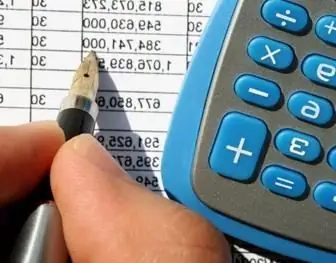2026 Author: Howard Calhoun | calhoun@techconfronts.com. Last modified: 2025-01-24 13:10:26
Under the receivables it is customary to understand the amount of debts that individuals or legal entities must pay to the enterprise as a result of economic relations on a contractual basis. Accounts receivable may appear in the process of concluding transactions involving installment payments or the sale of goods, the provision of services on credit.

Practice repeatedly confirms that today none of the entities with the formation of a legal entity operates without receivables, since its occurrence can be easily explained by real reasons:
• if we consider this issue from the side of the debtor's organization - the existence of receivables helps to attract additional capital, while the working capital of the enterprise remains intact;
• from the point of view of the creditor enterprise - accounts receivable significantly expands the market for work, sales of goods and services.
Funds, inwhich include accounts receivable of the enterprise, are withdrawn from the economic turnover of the organization, which, of course, cannot be attributed to the pluses of its financial activity. During the period of economic activity, a sharp increase in debt should not be allowed, since in practice cases of collapse of economic entities have already been repeatedly identified, therefore, the accounting department of the enterprise has a great responsibility to control accounts receivable. To ensure the sustainable state of the enterprise, one important point must be taken into account: the amount of receivables must exceed the amount of accounts payable.

Regardless of whether short-term or long-term receivables, past due or real, are recoverable or uncollectible, most importantly, they must be correctly accounted for and written off so that there are no questions from the tax inspectorate.
Receivables appear after the conclusion of a loan agreement for the provision of services, works, sales of products, goods in the accounting of the supplier enterprise. But this does not exclude the moment when receivables become overdue, as well as situations when the buyer cannot pay off his obligations in full.
In the company's accounting, the amount of debt is reflected in the asset balance sheet on a certain date until the buyer fully pays for it. In the event that the payment does not reach the company's account, for example, due tothe liquidation of the acquiring enterprise, the debt may become uncollectible, which may lead to the need to write it off. In addition, it must be done no later than a certain date and with documentary evidence.

In order to classify doubtful debt as bad debt and later write it off as non-operating expenses, one point must be taken into account:
• The statute of limitations is three years under civil law. In the event that the term is not specified in the contract, the countdown starts from the time the borrower is presented with a demand for performance and is seven days: article 314 of the Civil Code of the Russian Federation.
Receivables, for which the statute of limitations has already passed, are written off based on the data obtained as a result of the inventory, order and written justification of the head of the enterprise.
If the period for storing documents has already expired, it is not recommended to destroy them, since in the absence of documentary evidence during a tax audit, written-off bad debts will be excluded from expenses and additional pen alties and taxes will be charged.
Recommended:
What does early loan repayment mean? Is it possible to recalculate interest and return insurance in case of early repayment of the loan

Each borrower should understand what early repayment of a loan means, as well as how this procedure is performed. The article provides varieties of this process, and also lists the rules for recalculating and receiving compensation from an insurance company
Collection of receivables: terms and procedure

Collection of receivables is required in a situation where debtors do not repay their debts to the company on time. The article describes what methods of recovery can be used by the enterprise. Lists different methods to return funds after a court decision
Evaluation of receivables: methods, features of the procedure, examples

In the process of carrying out business activities, accounts receivable (RD) arise. This may be the amount of funds for the supply or the value of goods that the lender plans to receive at the agreed time. DZ is accounted for in the balance sheet at actual cost and includes settlements: with buyers/customers; on bills; with subsidiaries; with the founders on contributions to the capital; on advances
Product description: an example of how to write a detailed description, write a business plan

If you could not find a business plan with a description, characteristics of the product that you plan to promote, then you need to start compiling it yourself. What sections does a business plan include? What are the stages in its preparation? And finally, how to arouse sincere interest among investors? All these and other equally interesting questions will be discussed in the article
Loan repayment methods: types, definition, loan repayment methods and loan payment calculations

Making a loan in a bank is documented - drawing up an agreement. It indicates the amount of the loan, the period during which the debt must be repaid, as well as the schedule for making payments. The methods of repayment of the loan are not specified in the agreement. Therefore, the client can choose the most convenient option for himself, but without violating the terms of the agreement with the bank. In addition, a financial institution can offer its customers various ways to issue and repay a loan

